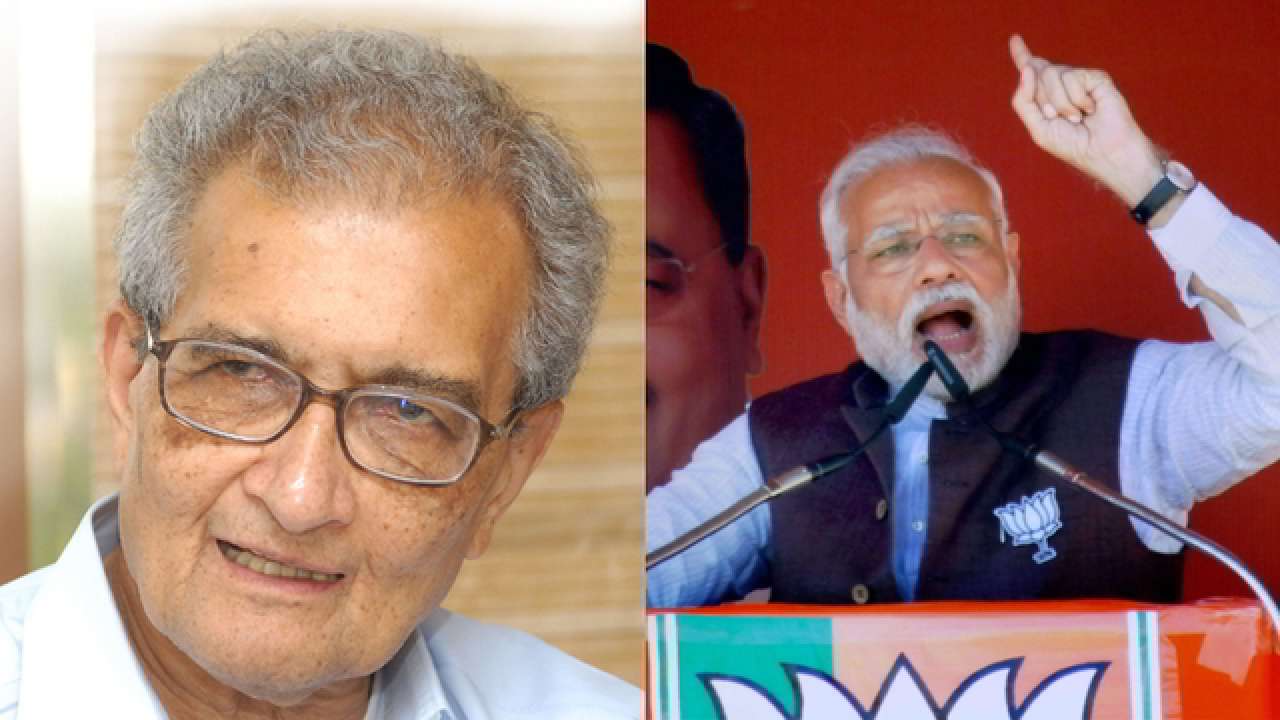
In its current avatar, the BJP is seen as a party which is obstinately anti-intellectual. The comparison is fuelled by the notion that most intellectuals in India are left-leaning, ergo ideologically opposed to the BJP and Prime Minister Narendra Modi. At times, the criticism against PM Modi and his government is often unwarranted, and this was evident in the way demonetization was slammed by critics.
Now, buoyed by the Central Statistics Office (CSO)’s report of GDP hitting 7.1% in the third-quarter of the year, despite demonetization, PM Modi hit out at detractors in spectacular fashion at a rally in Maharajganj. Modi hit out at economists from "Harvard and Oxford", saying that "hard work was more powerful than Harvard". While the PM didn’t take any names, his remarks were aimed at Nobel laureate Amartya Sen, who is a professor at Harvard, and Dr Manmohan Singh, whose alma mater is Oxford.
While the attack on Singh can be justified as political retribution, given the former PM Manmohan Singh had called demonetization "organised loot and plunder", the attack on Sen was uncalled for even though he’d called the move a "despotic action that has struck at the root of economy based on trust".
Now there’s no denying that the criticism of demonetization has been over-the-top, its ill-effects exaggerated and its benefits considered non-existent. Even the criticism from economists around the world needs to be taken with a pinch of salt since something of this magnitude has never been tried before. The political backlash from the electorate that many experts predicted also didn’t come along as the BJP did surprisingly well in all elections held post demonetization.
Also, whether demonetization actually has any tangible benefits will only be clear in the future, and it’s simply too early to tell, and a third-quarter GDP won’t be the gauge the success or failure of the process.
All this makes PM Modi’s attack on Sen more mystifying and unnecessary, even though the BJP has a history of attacking Sen more than other intellectuals. In 2013, when Amartya Sen had said that Modi shouldn’t be PM, BJP’s Chandan Mitra had demanded that he be stripped off his Bharat Ratna, remarks that Mitra later said he regretted.
Similarly, West Bengal BJP president Dilip Ghosh recently questioned Sen’s contribution to the nation. He said: “A fellow Bengali among us has won the Nobel Prize and we are proud... But, what has he done for the state? What has he given to the nation? No one in Bengal understands him. He is in extreme pain because he was removed as the chancellor of Nalanda University. Such people are spineless and they can be purchased or sold, and can stoop to any level. What has he achieved? No one in the world understands it. I have doubts whether he himself understands it.”
The remarks made by Mitra, PM Modi and Ghosh against Sen are abhorrent and uncalled for, and if the right-wing does intend to create its own intellectual narrative they need to know that they can’t do so by berating the Left or its icons. Rejection or ignorance of Sen’s works might earn the BJP a few votes but it’s hardly going to stand them in good stead. After all, Sen is one of India’s most distinguished economists and his work on famine, human development theory and welfare economics is celebrated across the world. His essays on a host of topics from history to Sanskrit to pluralism to inequality are eye-openers for many of us. One assumes that Nobel Prizes in Economics aren’t just handed out on the whims and fancies of juries.
One can disagree with Sen’s economic policies, but to attack his contribution personally, when he was awarded a Bharat Ratna by a BJP government in 1999 is dunderheaded. The need of the hour isn’t to hound academics but counter them on an intellectual level.
While there might be short-term gains by mocking academics like Amartya Sen, or former RBI governor Raghuram Rajan, in the long-run it gives credence to the notion that the BJP does not value academic excellence. It might not hurt them in the short run, but it will help the opponents paint the party as a part of philistines, which might destroy the popularity the party enjoys with the educated middle class.
The likes of Sen are serious people, who have spent the better part of their lives studying their respective fields, and if they are to be countered, they should be rebutted with intellectual arguments, and not ad hominem mockery.
In fact, PM Modi would do well to follow a leader he has been compared to in the past— former French President Charles de Gaulle. During the civil disobedience movement in 1968, French philosopher and the father of existentialism Jean Paul-Sartre had been arrested for being part of the movement. The fiercely nationalist former de Gaulle however vetoed the idea and issued him a pardon, saying: “You don’t put Voltaire in jail.”
De Gaulle’s reaction to Sartre shows that no matter how dissenting an intellectual is, there’s no need to attack him personally. PM Modi could do well to take a leaf out of the de Gaulle’s book on how to treat intellectual opponents, who deserve a modicum of respect.